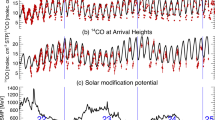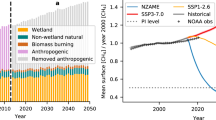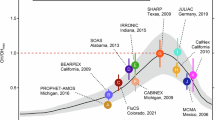Abstract
IT has generally been assumed that in the uncatalysed slow combustion of methane at below atmospheric pressure (temperature-range ∼ 400°–700° C.) peroxides, other than hydrogen peroxide, play no part and the reaction between methyl radicals and oxygen is: 
This is a preview of subscription content, access via your institution
Access options
Subscribe to this journal
Receive 51 print issues and online access
$199.00 per year
only $3.90 per issue
Buy this article
- Purchase on SpringerLink
- Instant access to the full article PDF.
USD 39.95
Prices may be subject to local taxes which are calculated during checkout
Similar content being viewed by others
References
For example, Tipper, C. F. H., Quart. Rev., 11, 313 (1957).
Cartlidge, J., and Tipper, C. F. H., Anal. Chim. Acta, 22, 106 (1960).
Kirk, A. D., and Knox, J. H., Trans. Farad. Soc., 56, 1296 (1960).
Shanin, M., and Kutschke, K. O., J. Phys. Chem., 65, 189 (1961).
For example, Karmilova, L. V., Enikolopyan, N. S., Nalbandyan, A. B., and Semenov, N. N., Russian J. Phys. Chem., 34, 562 (1960) (English translation).
Author information
Authors and Affiliations
Rights and permissions
About this article
Cite this article
FISHER, I., TIPPER, C. Methylhydroperoxide and the Slow Combustion of Methane. Nature 195, 489–490 (1962). https://doi.org/10.1038/195489a0
Issue date:
DOI: https://doi.org/10.1038/195489a0



